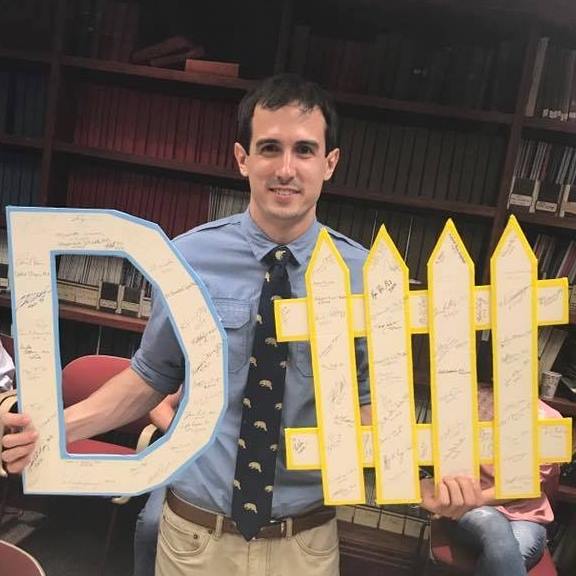Matt Jenior
PhD Candidate since 2012
Research areas
- Colonization Resistance
- Clostridium difficile
- Mouse models
- Microbial ecology
- Bioinformatics
Education
- BA: Hiram College (2011)

Background
For my thesis research I study the role that the gut microbiota has in resisting antibiotic-associated colonization of the bacterial pathogen Clostridium difficile. Using a mouse model of infection with varying antibiotic pretreatments, I quantify changes in remaining gut community structure and metabolism through a combination of methods; including culture-based techniques, 16S rRNA gene sequencing, metagenome-directed metatranscriptomics, and genome-scaling metabolic modeling. Preliminary results have revealed several groups of bacteria and metabolic pathways that may be involved in outcompeting C. difficile for it’s preferred nutrient niche during infection. Additionally, C. difficile alters it’s own metabolism to cope with unique environments in which it is colonizing. These data may prove valuable for identifying probiotic species or processes that can prevent C. difficile colonization in susceptible individuals in a targeted way.
Papers from time in Schloss lab
- Baxter NT, Wan JJ, Schubert AM, Jenior ML, Myers P, Schloss PD. 2015. Intra- and interindividual variations mask interspecies variation in the microbiota of sympatric peromyscus populations. Appl Environ Microbiol. 81: 396-404. DOI: 10.1128/AEM.02303-14.
- Schloss PD, Jenior ML, Koumpouras CC, Westcott SL, Highlander SK. 2016. Sequencing 16S rRNA gene fragments using the PacBio SMRT DNA sequencing system. PeerJ. 4: e1869. DOI: 10.7717/peerj.1869.
- Jenior ML, Leslie JL, Young VB, Schloss PD. 2017. Clostridium difficile colonizes alternative nutrient niches during infection across distinct murine gut environments. mSystems. 2: e00063-17. DOI: 10.1128/mSystems.00063-17.
- Jenior ML, Leslie JL, Young VB, Schloss PD. 2018. Clostridium difficile differentially alters the structure and metabolism of distinct cecal microbiomes to promote persistent colonization during infection. mSphere. 3: e00261-18. DOI: 10.1128/mSphere.00261-18.
- Hagan AK, Lesniak NA, Balunas MJ, Bishop L, Close WL, Doherty MD, Elmore AG, Flynn KJ, Hannigan GK, Koumpouras CC, Jenior ML, Kozik AJ, McBride K, Rifkin SB, Stough JMA, Sovacool KL, Sze MA, Tomkovich S, Topçuoğlu BD, Schloss PD. 2020. Ten simple rules to increase computational skills among biologists with Code Clubs. PLOS Computational Biology. 16: e1008119. DOI: 10.1371/journal.pcbi.1008119.
- Leslie JL, Jenior ML, Vendrov KC, Standke AK, Barron MR, O’Brien TJ, Unverdorben L, Thaprawat P, Bergin IL, Schloss PD, Young VB. 2021. Protection from lethal Clostridioides difficile infection via intraspecies competition for co-germinant. mBio. 12: e00522-21. DOI: 10.1128/mBio.00522-21.